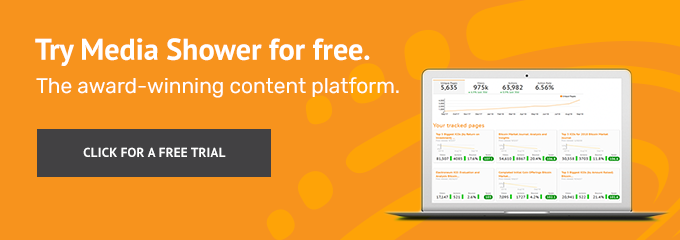The Ultimate Guide to B2B Subject Matter Expert (SME) Interviews
TL;DR: In B2B marketing, you can leverage your Subject Matter Experts (SME) to create blogs, ebooks, and videos to engage your current audience and attract new customers. Read our ultimate guide to learn how.
So What? Running an SME interview takes skill and attention to detail, which starts well before you chat. Here, we’re covering the basics of what it means to plan, execute, and take control of an SME interview:
- Planning to accommodate the SME’s time, patience, and knowledge.
- Researching to get real insights rather than the high-level information you can get from a bio.
- Using the right tools and tech to eliminate friction around scheduling, recording, transcribing, and taking notes.
How to Use Our SME Interview Assistant
If you’re ready to get started, then our AI-powered assistant will help you generate expert interview questions, instantly and free. Remember: the more information you give it about your expert, the better the questions you’ll get out of it.
What are SME Interviews?

Subject Matter Experts (SMEs) are the brains within your company, the ones highly sought after for their insights–insights that can serve as the foundation for high-quality marketing materials.
A B2B SME interview can lend credibility to all your marketing assets, including product advertising, long-form thought leadership, blogs, videos, and more.
It’s usually the marketer’s job to interview the SME. These interviews require significant preparation, attention to detail, and consideration of the SME’s time and energy. In the following article, we’ll guide you through SME interview tools and techniques so you can create practical discussions that your SME (and your audience) will love.
The Importance of Investing in SME Interviews
Some of the core benefits you get from building content around SME interviews include:
- Accuracy and Credibility: SMEs can provide accurate, up-to-date information on developments in their field, which can help you and other members of your marketing team craft content your audience will trust.
- Product Insights: Often, your SMEs know the product inside and out and can provide protips or explain advanced features in a way that you may not understand (but your customers will).
- Thought Leadership: An SME’s affiliation with your brand can help position it and your offerings as industry leaders.
- Insider Wisdom: By sharing their opinions on industry trends and best practices, SMEs can help you stay ahead of the curve and create relevant, exciting content.
- A Bigger Audience: Because SMEs are often too busy to create their content, well-produced content that uses expert insight is a win-win, linking your offering to an industry-respected professional while offering the SME high-quality publicity without the required time and effort.
Preparation: Setting Objectives for the Interview
As a rule, SMEs are in high demand and have precious few hours to spare, so the more efficient you are with their time, the better.
Interviewers should do their homework well before they enter their SME interview. Additionally, a briefer, more productive interview means you’re more likely to get the information you need to craft a good product for your audience.
At a bare minimum, you should walk into a SME interview following these steps:
- Identifying Project Objectives: Ask yourself what you hope to achieve by conducting the interview. A concise response to this question can help you figure out the role you see the expert’s answers playing in your campaign, project, or article.
- Determining Topics & Drafting Questions: Once you know the main aim of sitting down with your SME, you can develop some “must-discuss” topics and assemble some questions to guide your conversation. Keep your questions open-ended so you don’t elicit simple yeses or nos.
- Doing Your Homework: Before the interview, research the SME on LinkedIn and understand their general role within the company. Do light research on their background and skim anything they’ve published. Often, you can work these details into the interview.
Marketer’s Takeaway: When writing your interview questions, remember to strike a good balance between specificity and generality. For example, rather than ask, “Does this trend concern you?” try “What are your thoughts on this trend?” For a half-hour interview, have about ten questions ready to go. Be sure to get your SME a polished version of your planned questions at least a day before the interview.
Structuring the Interview
Some things to consider when structuring your interview:
- In-Person vs. Remote: What’s the most convenient way for your SME to talk to you? Will anyone else be present during the interview? For most SMEs, an online video call is most accessible – and keep it to half an hour.
- Setting it Up: Instead of going back and forth on available time slots, just pick a time that works for you, send them the invite, and dial in. Let them know you’ll move it if they suggest an alternate time.
- Recording: Most video-call software has recording options, so let them know at the outset that you’ll be recording the call for your private use if that’s OK. Protip: if you’re not in charge of the recording, start a backup recording device (your phone’s audio recorder works well).
- Length: Try to keep your interview to around half an hour. This is short enough that most people can fit it into their schedules if given enough time to plan. Make sure to end on time, forcing long-winded SMEs to focus their thoughts.
- Tools and Technology: A wide variety of tools are available for conducting and recording interviews. They include:
- Zoom: The standard for video calls, Zoom is free and easy to pick up for anyone inside and outside an organization. (Be sure to record on your local device; cloud recording has been known to fail.)
- Google Meet: Meet is Google’s version of Teams: a video chat plugged into the Google Cloud ecosystem, with the added benefit of being entirely browser-based.
- Microsoft Teams: Microsoft’s communication platform includes video and text chat, file sharing, and integration with the Office suite of tools.
- Rev: A transcription service staffed by experts for accurate interview transcripts.
- TranscribeMe is an affordable option with human and AI transcription services that can scale up to your needs.
- Otter.ai: An automated AI-powered transcription service that integrates with platforms like Zoom to support options like automatic video transcription and scheduling.
- Zoom: The standard for video calls, Zoom is free and easy to pick up for anyone inside and outside an organization. (Be sure to record on your local device; cloud recording has been known to fail.)
Marketer’s Takeaway: To respect the SME’s time, aim for half-hour interviews. Take the lead on scheduling, but be flexible if the time doesn’t work. Leverage new technology to streamline processes like scheduling and note-taking to reduce friction between stakeholders.
Background Research

Generally, your SME interview should be about a specific topic or theme. Do your research ahead of time. Here are some tips:
- Study the SME: Conduct a basic background on your SME so you know the essentials and can ask for more meaningful follow-ups during your discussion. (On the other hand, don’t go overboard–you don’t need to deep dive on their Facebook account.)
- Pre-interview Questions: Email your SME a simple list of tailored questions before the call. This will help the SME prepare, keep the interview on track within the allotted time, and provide the basis for further discussions.
Examples of Good SME Interview Questions
Case 1: GreenTech Solutions (Clean Energy Consulting)
SME: Dr. Amelia Johnson, Chief Sustainability Officer
Interview Topic: Future Trends In Renewable Energy Adoption
Here are examples of good interview questions:
- Opinion-based: In your experience, what are the most significant barriers businesses face when considering switching to renewable energy sources? What do you think are the most promising solutions to overcome these hurdles?
- Situational: GreenTech Solutions is developing a new consulting package for helping businesses navigate the complex regulatory landscape surrounding renewable energy. What key information and insights should we include in this package to be most valuable to our clients?
- Predictive: Looking ahead 5 to 10 years, what technological advancements or policy changes do you anticipate having the most significant impact on the widespread adoption of renewable energy?
- Comparative: How does the renewable energy adoption landscape differ across various industries? What unique challenges and opportunities do specific sectors face?
- Cost-benefit: In your experience, do renewable energy’s long-term cost savings and environmental benefits generally outweigh the initial investment for businesses? Can you elaborate on factors influencing this balance?
- Incentives: What role do government incentives and subsidies play in encouraging businesses to switch to renewable energy? Are these incentives effective, and how can they be improved?
- Social impact: How can businesses leverage renewable energy adoption to enhance their corporate social responsibility (CSR) initiatives and reputation?
- Skilled workforce: What initiatives are needed to ensure a skilled workforce prepared to design, install, and maintain renewable energy systems?
- Community engagement: How can businesses effectively engage with local communities when considering and implementing renewable energy projects?
- Data and Metrics: What key performance indicators (KPIs) and data points should businesses track to measure the success of their renewable energy investments?
Case 2: InnoMed Pharmaceuticals (Medical Device Manufacturer)
SME: Dr. David Chen, Head of Research and Development
Topic: Latest Advancements In Medical Device Design and Functionality
Examples of suitable interview questions:
- Experience-based: Can you share a specific example of a project you led in R&D that resulted in a breakthrough medical device innovation? What were your key challenges, and how did you overcome them?
- Challenge-based: InnoMed focuses on developing next-generation medical devices that prioritize patient comfort and ease of use. What specific design features or technologies hold the most potential in achieving this goal?
- Future-oriented: How do you envision the role of artificial intelligence and machine learning in shaping the future of medical device development and patient care?
- Regulation: How do regulatory requirements and approval processes impact the development and commercialization of innovative medical devices?
- Patient adoption: What strategies can be implemented to encourage patient acceptance and adherence to new medical device technologies?
- Data privacy & security: How can medical devices integrate seamlessly with patient data management systems while ensuring data privacy and security?
- Accessibility: How can we ensure that innovative medical devices are accessible and affordable to patients from diverse socioeconomic backgrounds?
- International reach: What considerations are essential when designing and developing medical devices for international markets?
- Collaboration: How can collaboration between stakeholders, including researchers, clinicians, and manufacturers, accelerate innovation in medical devices?
- Ethical considerations: What ethical considerations arise with developing and using increasingly sophisticated medical devices?
Case 3: CloudWeaver (Cybersecurity Software Provider)
SME: Ms. Sarah Rodriguez, Director of Threat Intelligence
Topic: Evolving Cybersecurity Threats and Mitigation Strategies
Examples of suitable interview questions will include:
- Trend-based: What are the most concerning trends in cyber threats targeting businesses? How are these threats becoming more sophisticated, and what new vulnerabilities are emerging?
- Solution-based: CloudWeaver’s software integrates various security tools to provide comprehensive protection. What are the most critical features and functionalities such software should offer to stay ahead of evolving threats?
- Best practice: Can you share some practical best practices that businesses of all sizes can implement to strengthen their cybersecurity posture and minimize the risk of data breaches?
- Attribution: How effective are current methods for attributing cyberattacks to specific actors or groups? What challenges remain in this area?
- Human element: How can cybersecurity solutions address the human element of security risks, such as phishing attacks and social engineering?
- AI & automation: How can artificial intelligence and automation be leveraged to enhance cybersecurity threat detection and response capabilities?
- Disaster recovery: What best practices should businesses follow to ensure effective disaster recovery in the event of a cyberattack?
- Cyber insurance: How can cyber insurance play a role in mitigating the financial impact of cyberattacks on businesses?
- Security awareness & training: How can businesses effectively educate and train employees on cybersecurity best practices to minimize vulnerabilities?
- Continuous improvement: What strategies can businesses implement to ensure their cybersecurity measures stay up-to-date and adapt to evolving threats?
Marketer’s Takeaway: A little preparation will make for a better interview. For a half-hour interview, prepare about ten questions (you may not get to them all). You can go off-script to make it more conversational.
Conducting the Interview

Conducting SME interviews is less science and more art, where paying attention to the flow of conversation and social cues can help keep the discussion enjoyable. Knowing how to direct the conversation naturally once the interview begins will help you get the necessary information.
Here are some of the best ways to do it:
- Be A Good Listener: After you ask a question, pay attention to the response, keeping an ear out for key points, especially those involving dates, names, and figures. Repeat these to your SME and ask for confirmation that you have them right. Be an active listener, ready to respond with follow-ups you may not have in your pre-written list.
- Open-Ended Questions: As mentioned before, resist asking anything that will get you a simple yes or no. Allowing an interview subject some movement in their answers often brings you the good stuff.
- Adjust As Needed: Be willing to pivot and adapt. If the interview goes in a different direction from your planned one, that’s OK – as long as it’s beneficial. If the discussion is veering into time-wasting territory, do your best to redirect with a question from your list.
Marketer’s Takeaway: During the interview, repeat critical points made by your SME and use them to form new questions. Let your SME veer off-track if you’re getting good content, but feel free to pull them back if they’re meandering. Listen actively!
Post-interview: How to Harness Interview Insights
Your work isn’t over when the interview wraps. It’s time to formulate a plan to turn the SME’s responses into content your audience will want to consume. This means organizing and synthesizing what you’ve got with your research and analysis.
- Transcribing and Organizing the Interview: Use shorthand to take notes during the interview, then transcribe the interview afterward (or use AI tools to do it for you). This will allow you to pull accurate quotes and re-familiarize yourself with information given during the interview.
- Validating Information: If your SME gives you any specific information–such as dates, names, or events–that should be looked into further, having a recording and transcription will help you verify accuracy.
- Outlining the Content: Consider creating an outline with key points and quotes. Then use the outline to write up a Q&A, long-form narrative, or case study for your website.
- Thanking Your SME: Don’t forget to send your SME a thank-you email (and a link to the draft piece when it’s ready).
Marketer’s Takeaway: Take notes and get a transcript. Blend responses, research, and analysis. And remember to thank your SME and share the final piece.
How to Use Your SME Interviews
- Customer Experiences: Given their industry experience, SMEs can be excellent storytellers. Customer experiences and case studies make great content and are often well-told by SMEs.
- Blog Posts: Interesting points made by a SME during an interview can be turned into blog posts, whether in Q&A format or a narrative with quotes sprinkled in.
- Social Media Campaigns: You can use direct quotes from your expert in social media ads, such as those promoting use cases, stories, or blogs.
- Videos: Short- and long-form videos on social media are highly popular with internet users. Consider producing engaging videos that share portions of your SME interview with your audience.
Marketer’s Takeaway: After the interview, review your material to see how it might fit into all your marketing channels. Depending on the SME’s camera-friendliness and quotability, you could get multiple marketing materials from a single SME interview.
Nail Your Next SME Interview with Media Shower
Are you looking for SMEs who can lend authority to your online content? Media Shower’s got you covered. Our award-winning content marketing team has been working with subject matter experts for nearly three decades–and we know how to leverage their knowledge to create content that gets you noticed. Take Media Shower for a test drive today.



